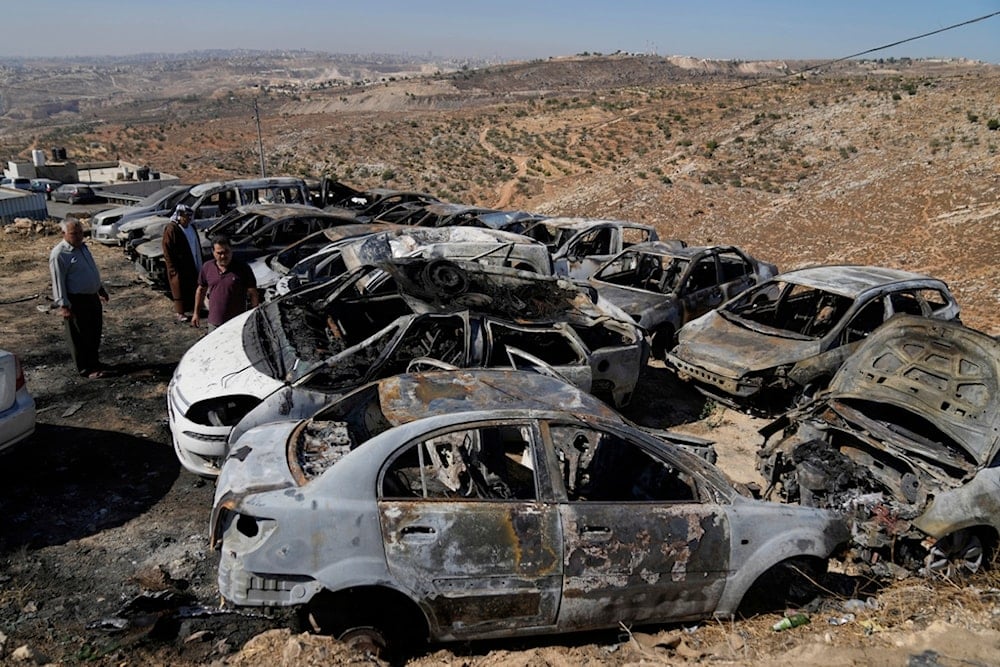Settler attacks intensify as Palestinians face systematic displacement
Israeli settler violence across the West Bank has surged to unprecedented levels, driving a systematic campaign to displace Palestinian communities under the cover of the Gaza war.
-

Palestinian landlord Saber Asaleyeh, 74 and his son Mohammad, front, inspect their scrapyard where vehicles were scorched during an Israeli settlers attack overnight, residents said, in the West Bank village of Burqa, east of Ramallah, Tuesday, July 15, 2025. (AP Photo/Nasser Nasser)
Abdullah Awad, speaking to the Financial Times, describes a reality Palestinians across the occupied West Bank know too well: armed Israeli settlers storming their land with the aim of driving them out. The attack on his family farm near Turmus Ayya, carried out by about 15 masked settlers, left his children screaming as the group smashed their home and equipment.
"The settlers had axelike sticks with nails attached. So, they intended to injure us badly or kill us. Thank God we were awake when they came, so we could move away a bit," he said. The assault followed years of harassment, but Awad says the violence has intensified since the war on Gaza began: "There were many assaults. This was not the first, and won’t be the last . . . but since the start of the war [in Gaza], they have become more violent. The situation has changed."
Escalating campaign of settler aggression
Across the West Bank, Palestinians are facing an orchestrated campaign to terrorize communities and seize land. Settlers have attacked farmers, burned property, and raided villages from the northern hills to the southern plains. Videos of settlers beating Palestinians, including one incident in which a masked settler clubbed a woman unconscious, reflect a growing sense of impunity.
Shocking!
— Quds News Network (@QudsNen) October 19, 2025
Masked Israeli settler militias assaulted an elderly Palestinian woman this morning during the olive harvest season in the town of Turmus Ayya, northeast of Ramallah. The woman lost consciousness as a result of the attack. pic.twitter.com/fS3zvaCbQK
Political analyst Ibrahim Dalalsha told FT the pattern is unmistakable, "The settlers are totally emboldened, and the attacks are spreading, in the north, centre and south [of the West Bank]… This time they are really going deep inside."
Targeting the olive harvest, the backbone of Palestinian rural life
The olive harvest, which sustains thousands of Palestinian families, has become an annual target for settler groups seeking to disrupt livelihoods and claim new territory. This season, attacks have soared. Settlers have torched a mosque in Deir Istiya, burned cars and homes near Beit Lahm, and even stormed an industrial area close to Beit Lid.
According to UN OCHA figures, more than 260 settler assaults resulting in injuries or property destruction were recorded in October, the highest monthly total since monitoring began nearly two decades ago.
Israeli condemnations ring hollow as impunity deepens
Israeli leaders have issued belated statements condemning settler actions, but on the ground, Palestinians say nothing has changed. The army dismantled a single illegal outpost, an exception so rare it drew international attention, while settlers continue attacking communities without consequence.
The settlers who burned the Deir Istiya mosque left graffiti stating: "We’re not afraid of Avi Bluth."
Their message was aimed at the Israeli general responsible for West Bank operations, a taunt conveying how little fear violent settlers have of the regime’s security forces.
Rights group Yesh Din reports that 94% of settler violence cases were closed without charges in the 18 years before the war on Gaza. Palestinian officials say the situation has only worsened, with the military frequently standing aside, or acting in coordination with settlers during attacks.
Dalalsha said, "In the past, when there were attacks, there were investigations. Palestinians viewed these as a sham. But at least there was a process. These days, we do not hear of anything."
Forced displacement as policy
Settlement expansion, illegal under international law, has accelerated at a pace Palestinian rights groups describe as intentional and strategic. Reports indicate that since the start of the war on Gaza in 2023, 44 Palestinian communities have been forcibly pushed from their lands through settler assaults combined with military restrictions.
Yair Dvir of B'Tselem put it bluntly, "When you look at what is happening, there is an order to [the attacks] . . . It’s not just individuals and settlers. They are backed by the Israeli system. There is a very clear goal, which is to forcibly displace the Palestinians and force them into the big cities."
Daily terror in towns under siege
In Sinjil, a town outside Ramallah, a newly built settler outpost has triggered relentless harassment for Palestinians. Mayor Moataz Tawafsha told the FT: "There is no day without an attack. They steal tractors, burn stuff that belongs to the farmers, prevent farmers from reaching their land. Every day. They never stop."
Near Turmus Ayya, settlers have placed a metal cabin and tent on a Palestinian building left half-finished and raised an Israeli flag above it, a symbolic claim over land that locals have farmed for generations. The new presence has cut Palestinians off from hundreds of hectares of farmland, including thousands of olive trees.
The mayor, Lafi Adeeb Shalabi, says the aim is clear, "They are trying to destroy the history of Palestine . . . This land belonged to our families, to our great great-grandfathers," he said. "And when we try to defend it, they say we are terrorists."
A systematic drive to empty Palestinian land
Testimonies from across the West Bank point to a coordinated effort to dispossess Palestinian communities: settlers advancing deeper into Palestinian areas, soldiers restricting movement, homes and farms burned, and entire communities uprooted.
What was once seasonal harassment has evolved into a sustained campaign of displacement.
Read more: West Bank sees massive IOF raids, 19+ Palestinians detained

 5 Min Read
5 Min Read








